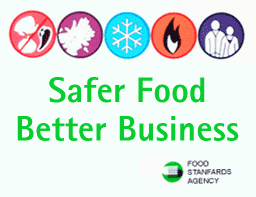Safer Food Better Business - Keeping Your 5* Food Hygiene Rating - Part 3
Part 3 Cleaning – 3 Key Points
“Effective cleaning is essential to get rid of harmful bacteria, viruses and allergens to stop them spreading to food”

I know from my long experience in catering that many chefs and cooks really don’t like washing up or cleaning, especially at the end of the shift and it’s time to go home. A quick spray of sanitiser, dry with the back of their apron and the job’s done. Looks clean, doesn’t it? Hmmm……
With a lot of small businesses, kitchen porters and assistants are teenagers and students working part-time or casually and very often don’t understand the importance of keeping kitchens properly clean.
Ensure your staff undertake really good training, even if it’s basic induction training to understand why the job is vital to you keeping your 5* FHRS. Make it a part of everyone’s duty, it’s done frequently and that it’s supervised. You could have an incentive scheme such as a score card for those who have completed the best cleaning of their work areas. Also make sure you have lots of good quality cleaning materials.
3 Key Points
When completing this section of the Safer Food Better Business pack, there are 3 key points that you must know: -
1. The 2 Stage Cleaning Method
Cleaning should always be done with the 2-stage method after having removed food, and cleaned away any visible dirt, grease or debris first!
Use hand hot soapy water to wash the surface, allow to air dry, or use disposable paper.
Disinfect or Sanitise leaving it on the surface for the correct contact time
2. Separate Sinks

When cleaning chopping boards, utensils and knives used in raw food preparation, where possible use a separate sink. If that’s not possible, you could use a separate
colour coded washing up bowl just for that purpose. If you only have 1 sink, wash all equipment and utensil used for raw food prep first, then clean the sink using the 2 stage method. It is also good practise to use a dishwasher for all equipment and utensils. Remember to keep your dishwasher in good repair with regular maintenance.
3. Sanitising and hand soap standard BS EN 1279 or 13697
Have you checked your sanitizer and hand-wash meets the BS EN standards for your cleaning materials? Look for the numbers on the bottles, and have a copy of the Safety Data Sheet in with your Cleaning Schedule.
So what happens when things go wrong and you can’t clean properly or things weren’t cleaned properly? Don’t be afraid to log the problem in the Daily Diary, it shows you’re being honest! You then need to log why it happened such as the dishwasher broke down or a member of staff didn’t do their job properly. Then what did you do about the problem? How did you wash up when waiting for the repair to be completed or install a new dishwasher. Did you retrain your member of staff or ask their supervisor to undertake extra checks?
Still not sure you know what you’re doing is going to get you your 5* Food Hygiene Rating? Give me a call, I’d be happy to chat more.


![web logo colour[1].png](https://static.wixstatic.com/media/83bd66_402cd5447f424bb4afaebafee7b09836~mv2.png/v1/fill/w_373,h_221,al_c,q_85,usm_0.66_1.00_0.01,enc_avif,quality_auto/web%20logo%20colour%5B1%5D.png)













